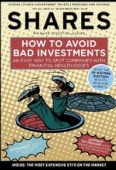Archived article
Please note that tax, investment, pension and ISA rules can change and the information and any views contained in this article may now be inaccurate.
Why isn’t the oil price surging on Iran sanctions?

Oil prices appear to be struggling for direction despite the renewal of US sanctions on Iran. The market had previously expected this event to be a major catalyst for crude prices.
Iran was among the factors which helped lift oil prices to multi-year highs above $85 per barrel in early October before the commodity got caught up in the wider market fallout last month. Brent crude, the global benchmark, is currently trading at around $73 per barrel.
‘Benchmarks have been under pressure of late as major producers, including Saudi Arabia, the US and Russia, have ramped up output to near-record levels, while weak economic figures in China have cast doubt on the demand outlook,’ says broker Cantor Fitzgerald.
Some analysts believe the impact of Iranian sanctions is being underestimated. In a Bloomberg interview Goldman Sachs’ global head of commodities Jeff Currie said he expected oil to bounce back to $80 per barrel before the end of the year citing oil stocks below the five-year average and ‘relatively good’ demand.
Ultimately the direction of oil prices may be led by how committed the US administration is to punishing Iran even if it means higher prices at the pump for US citizens.
At present eight countries, including China, have been presented with waivers allowing them to still import a reduced rate of Iranian oil for another 180 days. But Currie thinks these allowances will be cut more sharply than similar waivers offered under sanctions first imposed by President Barack Obama in 2012.
UK investors will likely feel the gyrations in the oil price most keenly in the share price performance of FTSE 100 index heavyweights BP (BP.) and Royal Dutch Shell (RDSB).
These companies saw contrasting fortunes with their recent third quarter updates. Every set of quarterly numbers so far for 2018 has seen BP do better than forecast and Shell do worse.
The 37% increase in Shell’s key measure of profit to $5.6bn, reported on 1 November, was short of the $5.8bn analysts had been expecting although cash flow reached nearly $15bn, the highest level since 2008.
BP was able to beat even elevated expectations and tellingly its $10.5bn acquisition of assets from BHP Billiton (BLT) are now going to be funded without a fundraise thanks to the robust cash flow performance. (TS)
Important information:
These articles are provided by Shares magazine which is published by AJ Bell Media, a part of AJ Bell. Shares is not written by AJ Bell.
Shares is provided for your general information and use and is not a personal recommendation to invest. It is not intended to be relied upon by you in making or not making any investment decisions. The investments referred to in these articles will not be suitable for all investors. If in doubt please seek appropriate independent financial advice.
Investors acting on the information in these articles do so at their own risk and AJ Bell Media and its staff do not accept liability for losses suffered by investors as a result of their investment decisions.
Issue contents
Big News
- What the US midterm election results mean for markets
- Aberdeen plans global private-market sustainability trust
- UK metal bashers are facing uncertainty as Brexit looms
- Trustpilot IPO could provide big bucks exit for seed backer Draper Esprit
- Living wage increase: which stocks are most impacted?
- Investors see value in emerging markets
- Why isn’t the oil price surging on Iran sanctions?
 magazine
magazine









